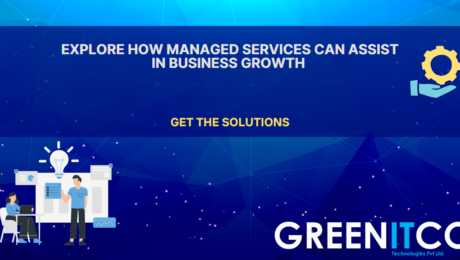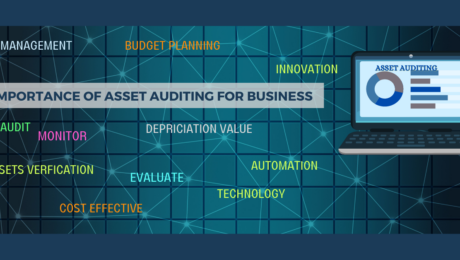What is an IT Ticketing System?
In today’s fast-paced digital environment, businesses must stay on top of IT issues to maintain smooth operations. An IT ticketing system is a vital tool for managing, tracking, and resolving technical problems. Whether it’s addressing a software glitch, hardware malfunction, or network outage, an IT ticketing system ensures these problems are efficiently handled. This article delves into what an IT ticketing system is, how it works, and why it’s essential for organizations of all sizes.
Understanding IT Ticketing Systems
An IT ticketing system, also known as a helpdesk or service desk system, is a software platform designed to manage and streamline IT support tasks. When users or employees encounter technical issues, they submit a “ticket” through the system, which contains details of the issue. The IT team then tracks the ticket from its initial submission to resolution.
The primary purpose of an IT ticketing system is to ensure that no issue goes unresolved and that the IT department can prioritize, assign, and monitor tasks effectively. By automating workflows and providing a structured approach to problem resolution, these systems save businesses both time and money.
Key Features of an IT Ticketing System
To better understand the value of an IT ticketing system, let’s explore some of its key features:
Ticket Management
The core functionality of an IT ticketing system is managing tickets. Tickets serve as digital records for tracking issues, requests, and incidents. Each ticket typically includes:
- Issue description
- Priority level (low, medium, high)
- Status (open, in progress, resolved, closed)
- Assigned IT technician
- Progress notes and solutions
Effective ticket management ensures support teams can track issues in real-time, reducing delays and miscommunication.
Automated Workflows
Automation is a game-changer in IT ticketing systems. Workflow automation eliminates the need for manual task assignments by routing tickets to the appropriate technician based on predefined rules. For example, an issue categorized as a “network outage” can automatically be assigned to a network specialist. This saves time and ensures tickets are handled by the most qualified personnel.
Prioritization and SLAs
Prioritization features allow IT teams to address critical issues first. Many ticketing systems offer Service Level Agreement (SLA) management tools, ensuring support teams meet response and resolution deadlines. High-priority tickets can trigger alerts or escalations if they are not addressed within a set timeframe, ensuring compliance with policies or client agreements.
Knowledge Base Integration
A knowledge base is a repository of helpful articles, FAQs, and troubleshooting guides. IT ticketing systems often integrate with a knowledge base, allowing users to resolve common issues independently, without creating a ticket. This reduces the workload on IT teams and empowers users to find solutions on their own.
Reporting and Analytics
IT ticketing systems provide reporting and analytics tools to help managers monitor performance, identify recurring issues, and analyse technician workloads. Reports on ticket resolution times, user satisfaction, and incident types help organizations make data-driven improvements to their support processes.
Multi-Channel Support
Advanced IT ticketing systems offer multiple communication channels—such as email, phone, chat, and web portals—allowing users to report issues in their preferred way. This feature ensures that tickets are captured regardless of the submission method.
Mobile Access
With remote work becoming more common, IT teams need access to the ticketing system from anywhere. Mobile apps or responsive web interfaces allow technicians to track and resolve issues on the go, enhancing flexibility and ensuring faster resolution, especially for time-sensitive problems.

Benefits of Using an IT Ticketing System
Implementing an IT ticketing system offers several advantages:
- Improved Efficiency
By centralizing all IT requests and issues, the ticketing system simplifies workflows for the IT team. Tickets are easy to track, assign, and prioritize, resulting in faster resolution times. Automation further enhances efficiency by reducing manual tasks. - Enhanced Collaboration
An IT ticketing system fosters collaboration among IT staff by enabling multiple technicians to contribute to a single ticket. This is particularly useful for complex issues that require input from specialists in different areas. It also improves communication between the IT team and users by providing real-time updates through the ticket. - Better Organization and Documentation
Each ticket serves as documentation of an issue, providing a detailed record that can be referenced in the future. This helps technicians resolve recurring problems more efficiently and maintains a history of incidents and solutions, which can be valuable for audits and compliance. - Increased Accountability
With tickets assigned to specific individuals and tracked throughout their lifecycle, IT teams maintain better accountability. Managers can easily see who is responsible for each task, ensuring no ticket slips through the cracks. - Scalability
IT ticketing systems are scalable, accommodating the needs of both small businesses and large enterprises. As an organization grows, the system can handle an increasing number of requests without overburdening the IT team.
Why Your Business Needs an IT Ticketing System
Regardless of the size of your organization, an IT ticketing system offers measurable advantages:
- Faster Response Times
With a ticketing system, issues are logged immediately and routed to the appropriate team members. Automation ensures high-priority tickets receive prompt attention, minimizing downtime and disruptions. - Reduced IT Costs
By streamlining processes and reducing inefficiencies, an IT ticketing system helps save money. It minimizes the time technicians spend on each issue and allows users to resolve common problems through self-service, optimizing resource allocation. - Improved User Experience
Fast and reliable IT support translates into a better user experience for both employees and customers. When issues are resolved promptly, users remain productive and satisfied. A well-implemented ticketing system also provides transparency by keeping users informed about the status of their requests, reducing frustration.
Conclusion
An IT ticketing system is essential for modern IT support, offering an efficient way to manage and resolve technical issues. From ticket tracking and automation to reporting and SLA management, these systems empower IT teams to provide high-quality support while minimizing costs and improving response times. Whether you’re a small startup or a large enterprise, adopting an IT ticketing system is a smart investment that will streamline operations and enhance user satisfaction.
For businesses seeking comprehensive IT ticketing tools, GreenITCo offers innovative solutions tailored to meet organizational needs. Their robust software, which includes integrated ticketing and asset management features, ensures no issue goes unresolved while maintaining optimal productivity across teams.
- Published in Asset audit, Asset Management, helpdesk outsourcing, ITM, Mobile, Technology, technology support
Key Rules and Compliance Aspects for Physical Asset Verification in India

Introduction:
Navigating India’s Regulatory Landscape for Physical Asset Verification
Adherence to Rules and Compliance is Paramount
In the intricate world of India’s regulatory framework for Key Rules and Compliance Aspects in Physical Asset Verification. Hence, adherence to rules and compliance is of paramount importance, particularly in the realms of finance, taxation, and public administration. Thus, these behaviors are shaped by a variety of legal frameworks and regulatory agencies.
Regulatory Framework for Physical Asset Verification
The Income Tax Department, under Section 142(2A) of the Income Tax Act, 1961, has the authority to mandate physical asset verification during audits. So, the Goods and Services Tax (GST) Act outlines rules, including physical asset verification, and the Companies Act, 2013, mandates periodic audits. Additionally, financial institutions are provided with detailed instructions for physical asset verification, especially for collateral evaluation or lending purposes, under the Banking Regulation Act.
Key Aspects and Regulations Influencing Physical Asset Verification
In India, the rules and compliance related to physical asset verification are governed by various regulatory bodies and laws. Particularly in sectors such as finance, taxation, and public administration. Here are some key aspects and regulations that could influence physical asset verification in India.
1. Income Tax Act, 1961
Under Section 142(2A) of the Income Tax Act, the Income Tax Department can mandate a taxpayer to get their books of accounts audited, including physical verification of assets.
2. Companies Act, 2013
Companies are required to maintain proper books of accounts and undergo periodic audits, including physical verification of assets. Section 143 of the Companies Act mandates statutory auditors to verify and report on the physical existence of assets.
3. Goods and Services Tax (GST) Act
For businesses registered under GST, there are provisions for maintaining proper records and undergoing audits that may include physical verification of assets to ensure compliance with GST regulations.
4. Banking Regulation Act
Financial institutions, governed by the Banking Regulation Act, may have specific guidelines regarding the verification of physical assets, especially for collateral assessment or loan purposes.
5. Central Public Procurement Portal (CPPP)
In government procurement, the Central Public Procurement Portal may have specific guidelines for physical asset verification in the context of asset management and accountability.
6. Indian Accounting Standards (Ind AS)
Applicable accounting standards may require entities to conduct periodic physical verification of assets to ensure accurate financial reporting.
7. Central Board of Direct Taxes (CBDT) Guidelines
CBDT may issue guidelines and notifications regarding the verification and substantiation of assets during tax assessments.
8. Regulatory Authorities
Various regulatory bodies such as Securities and Exchange Board of India (SEBI), Reserve Bank of India (RBI), Insurance Regulatory and Development Authority of India (IRDAI), etc., may have their guidelines pertaining to physical asset verification for entities under their respective jurisdictions.
9. Customs and Excise Regulations
Importers/exporters might be subjected to physical verification of assets as part of customs or excise compliance.
10. State-Specific Regulations
Some states in India might have specific regulations or requirements concerning asset verification, especially in sectors like real estate, infrastructure, etc.
These regulations and guidelines may require businesses, institutions, or individuals to conduct periodic physical verification of assets, maintain proper documentation, ensure compliance with accounting and taxation standards, and undergo audits by authorized entities or auditors.
It’s important to refer to the specific laws, regulations, and notifications issued by relevant authorities for precise details and compliance requirements regarding physical asset verification in India. Seeking guidance from legal or financial experts well-versed in Indian regulatory frameworks can help ensure adherence to these rules.
Compliance Requirements for Physical Asset Verification
These regulations and guidelines may require businesses, institutions, or individuals to:
- Conduct periodic physical verification of assets
- Maintain proper documentation
- Ensure compliance with accounting and taxation standards
- Undergo audits by authorized entities or auditors
Best Asset management company in India
In the realm of efficient asset management. The discerning entities often seek the services of the best Asset management company in India to navigate the complexities of compliance and optimization.
Top IT asset management software
Selecting an appropriate asset management system is essential for companies looking to optimize their processes and guarantee adherence to the various laws controlling physical asset authentication.
Top asset management software
Investing in the best IT asset management software is essential for businesses that focus on information technology assets to keep control and compliance over their digital infrastructure.
Best compliance software for asset management
Adopting the best asset management software provides a complete approach to managing and optimizing a wide range of physical assets, going beyond industry-specific solutions. The finest compliance software for asset management is essential to ensure that efficient asset management extends to compliance.
Seeking Expert Guidance
It is crucial to refer to the specific laws, regulations, and notifications. These are issued by relevant authorities for precise details and compliance requirements regarding physical asset verification in India. Seeking guidance from legal or financial experts well-versed in Indian regulatory frameworks can help ensure adherence to these rules.
Role of Asset Management Companies, Systems, and Software
In the realm of efficient asset management, discerning entities often seek the services of the best Asset management company in India to navigate the complexities of compliance and optimization. Choosing the right Asset management system and Top IT asset management software is crucial for businesses aiming to streamline their operations and ensure compliance with the diverse regulations governing physical asset verification.
Conclusion: Navigating the Complexities of India’s Regulatory Environment
Businesses, institutions, and individuals must carefully follow the various regulations. Also, governing physical asset verification when negotiating the complexities of India’s regulatory environment. A thorough strategy is necessary to ensure compliance with several rules such as the Companies Act, GST Act, Income Tax Act, and guidelines from the Reserve Bank of India (RBI) and Securities and Exchange Board of India (SEBI). State-specific laws and industry-specific norms emphasize the importance of due diligence even more. Especially, when it comes to infrastructure and real estate. It becomes essential to seek advice from legal or financial professionals knowledgeable about Indian regulatory systems in order to properly navigate this challenging terrain. This guarantees effective asset management in line with industry best practices. Also, adherence to the numerous laws and regulations.
- Published in Technology
How can Managed Services assist your business to grow?
The year has bought many new challenges and possibilities for businesses around the world to take your business to next level. Remote work and IT professional Assistance are important for every business. This article get insight to help you to understand the importance of managed services for your business.
Managed Service Providers offer different ranges of services. First, look over your agreement carefully to make sure you have an agreed-upon understanding of what is expected of your managed services expert.
If you are hunting for opportunities to grow your business, it is time to consider Managed Service Provider (MSP) work to improvise organization efficiency, reduce cost and offer the best assistance & resources. The growth of the organization is a long-time process; MSPs can streamline the workflow and manage the business operations efficiently.
Why do Businesses Need Managed Services?
Issues in business occur at times while managing tasks like
Businesses face many issues like :
- Maintaining the performance of IT infrastructure systems.
- Manage the risk of excessive cost – managing a business budget.
- To adopt new technologies to stay ahead in the digital ecosystem.
Issues like redundant system entries, updating and patching of software, and more take time for the IT team in an organization. They have less time to innovate or focus on the clients to help the business grow. To work with changing trends and overcome IT-related hassles, IT professionals need additional support. Change plays a vital role to deal with the new technology and stay ahead in this digital ecosystem. With the advent of digital transformation with advanced technology. IT management services should have more flexible and advanced features for more business optimization and regular maintenance.
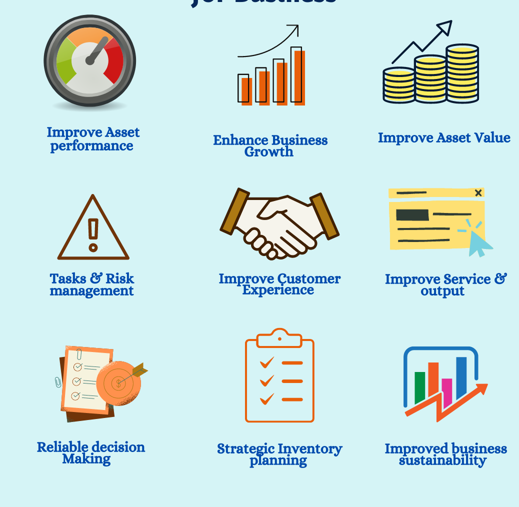
A business, small or large, needs technology and automation to grow, streamline processes, and compete in the market. In the coming years, technological advancements like cloud computing, big data, and mobility services will drive the growth ahead for managed services.
Businesses go for expert services to improve profit margins and meet the needs of this dynamic business environment. MSPs help organizations chart their future growth strategy with expert advisory services and keeping the factors in mind, like market demands, customer requirements, available resources, and more. MSP can initiate companies to grow and flourish at a pace. Get started.
Types of Managed Services
Managed services are structured in different areas:
- Delivery Platforms: includes SaaS, cloud, or local host system
- Technology Maintenance: includes maintenance of technology and delivering content.
- Security Operations: Managing the outcome-based delivery.
It depends on the Managed Service Provider ( MSP ) in which they excel and are ready to offer services related to it.
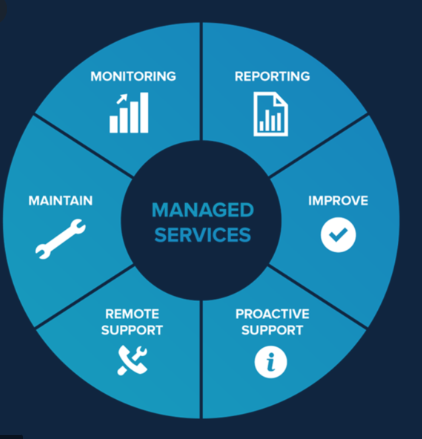
We have types of managed services available for your business:
- Managed SaaS (Software as a service):
- These managed service providers may offer a software platform. It can be subscription-based or centrally managed depending on services. Example managing Human Resource Department, Accounts department, or any. Only when SLA is in effect.
The role of MSP is to assist you in installation, customization, and troubleshooting, to ensure that your service remains at an optimal level. Side by side gives your employees focus on business needs
We have types of services available for your business:
Cloud Infrastructure Services:
Managed cloud service providers manage cloud services, their expertise offer cloud solutions for remote management and monitoring, etc. Organizations having managed cloud service provider can improvise their efficiency at work and create a sorted workflow.
Managed Security Services:
It offers facilities of remote security infrastructure. It includes a remote system, virtual desktop, and other services.
Network & Infrastructure services:
This type of MSP works for the network functions. It includes cloud network, infrastructure management, and monitoring them remotely. These types of services mostly have backup & storage management options.
Technical Support Services:
These services include providing complete IT support services. This service offers the staff members platform to contact through a remote support center at any time for guidance to fix the issues that they come across.
Communication Services:
MSP includes a communications service, for communication internally with customers. Managed communications typically include video calling, instant messaging technology, and email services.
Role of Managed Services for business development
The role the managed services play to meet the requirement of the organization and which need will be required ahead in the future. Utilizing the IT resources here Managed services are well to assist with effective output & better productivity.
Business is small or large all it needs is technology and automation to grow, streamline processes, and compete in the digital ecosystem. In advancements of technology like cloud computing, big data, and mobility services will drive the growth ahead for managed services. The businesses prefer these services to improve their profit margins and meet the needs of this dynamic needs business.
MSPs help organizations improve their future growth strategy with expert advisory services.
Keeping the factors in mind, like market demands, customer requirements, available resources, and more. MSPs are a good option for initiatives that wish the grow.
Final Thoughts
I hope this blog helped you recognize the importance of managed services for your business. Keeping the factors in mind, like market demands, customer requirements, available resources, and more. Thus, MSPs are necessary for initiatives that wish the grow. Now you can figure out how managed services can assist your business to grow and succeed. Let me know your feedback in the comments section.
- Published in Asset Management, Mobile, Networking, Technology
Importance of Asset Audit for Business
The importance of asset auditing for the organization cannot be underrated. Asset audit can help the organization minimize the costs spent on the depreciation and maintenance of the assets. Asset auditing software gives an idea to lower costs and helps the business to make an informed decision.
Our aim of asset audits is to manage compliance and task management and ensure asset accuracy. These factors are essential for making an informed business decision and streamlining workflow. Improvise business assets and resources efficiency with asset audits.
How asset audit can help you in business management?
Asset auditing plays an important role it is a process for ensuring the highest standards of accuracy. It also helps in compliance management of a company’s valuable equipment or machinery, helping to bring about more streamlined work processes and make informed decisions.
Every organization depends on physical & IT assets for its day-to-day operations. It requires long-term arrangements for auditing assets and managing them thoroughly. ‘ Asset Audit’, refers to a process by which an organization physically checks that the assets records exist, their location, status, condition, depreciation value & more. Check the availability of assets, their usage, and much more. Many tasks are managed by asset audit.
How can your business accelerate growth with an asset audit is done:
Without performing Asset audits for business thoroughly, it will not be possible to deliver the quality of work and asset usage. It the crucial to conduct an asset audit to make sure those assets are still physically available, their status and depreciation status, and much more.
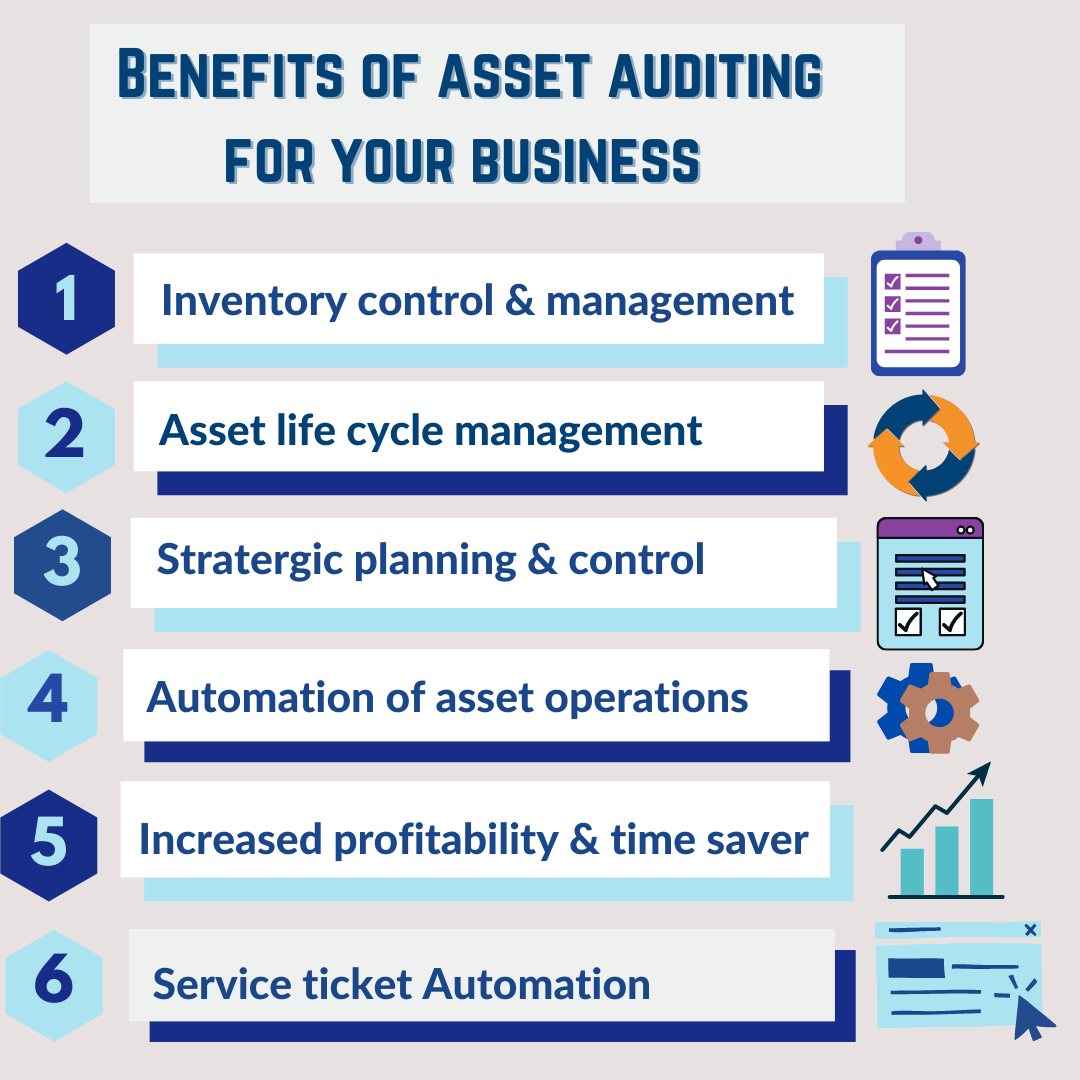
Every organization owns assets & so it becomes important to conduct asset audits to improve the functionality & long life of assets. To maintain the asset’s life and to avoid issues like human errors, ineffective process controls, improper functionality, and more. Asset auditing hardware is an effective way to track and manage a range of business assets. It can simplify the process, streamline workflow, and track operations effectively.
Hardware asset management is the process of managing IT components like desktops, laptops, servers, etc. It manages assets from verification to asset depreciation. With the hardware asset management process, you can get real-time details of your hardware asset inventory and much more details. It gives a bird’s-eye view of the asset life cycle and an overview of how assets are used in your organization & their performance.
We have highlighted the major benefits that asset audit
Business enhancement
An asset audit takes a birds-ey view of your organization’s internal & external systems and control. It suggests improvements that can make your business more efficient & productive. You can expect that the asset audit system offers a way to improve internal controls, business systems, accounting, and operational efficiencies, all identified through the audit process.
Compliance Management
The main aim of the audit is to meet the requirements and regulations of the business model. The asset audit assures the business owners or shareholders or buyers management of compliance and assets operations. are under control. Features of asset audit help business owners to make informed financial decisions in and more affirmed way.
Improvise Credibility at work
An audit provides asset verification and fair representation of the asset’s current situation. This provides credibility and confidence to the organization’s customers/clients, stakeholders, investors, and buyers.
Detect Preventive measures for Fraudulence
It’s estimated that up to 30% of businesses are subject to fraud, error, and insecurities. Error and insecurities at the workplace can occur without being detected, and it is a matter of concern. An asset audit can be an effective tool to identify fraud and opportunities that commit errors in operations and insecurities to the business. An efficient asset audit management system identifies an organization’s systems. Controls and suggests ways to strengthen these to prevent errors from occurring.
Better Planning and Budget system
An audit confirms the accuracy of an organization’s financial system and budget analysis. Asset audits conducted can improve future planning, decision-making, and budgeting. It’s a detailed process and can result in scrutinizing the expense made on certain types of income, expenditure, and assets.
Accurately calculate depreciation
Depreciation management of your assets can depend on how often they have been utilized and the condition in which they are kept. There is the reason for the depreciation of your fixed assets since they are steadily running to support your business. This means the value of assets would decrease with time, there is a requirement to manage the depreciation value. It is important to understand different assets will have different rates of depreciation.
Audit Director Bharat Gupta and the Audit team provide reviews and audits for organizations of all sizes and industries. To find out more about how we can help you, please contact Bharat on 09769022209 or email contactus@greenitco.com
- Published in Networking, Technology



